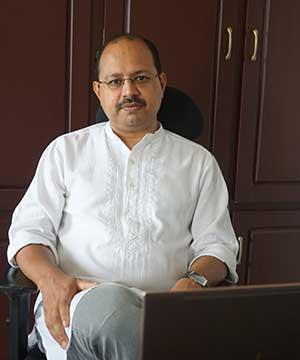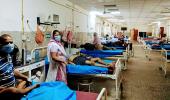'India was fortunate to have a late entry into the pandemic; even the first wave entered India 2-3 months after many other countries experienced it.'
'Similarly, the second wave reached here after other countries went through it.'
'Despite having seen what other countries faced, we didn't ramp up our infrastructure sufficiently enough.'
'We remained highly under prepared.'

"Compared to the first wave, the number of daily cases has more than tripled while the daily testing has gone up only by 50 per cent."
Shobha Warrier/Rediff.com discusses the Coronavirus Crisis with Dr Rijo M John, health economist and adjunct professor at IIM- Kozhikode. The first of a two-part interview:

India is witnessing close to more than 350,000 lakh cases and thousands of deaths every day. What kind of economic impact this devastation will have on the individual and the country as a whole?
It is too early to assess the damage as we are still at the evolving phase of the pandemic.
In the coming days, the number of cases and the number of deaths will go up. We are looking at 4,000-5,000 reported deaths and 400,000 to 500,000 reported cases daily in the coming couple of weeks.
The actual numbers would be much higher, but I don't think our surveillance system will report that.
At the individual level, the loss of lives will be very devastating for the family. We do not know whether the elderly or the young ones in the families are dying as we do not have the data to assess the proportion of death among the elderly versus the young.
Each life lost is a loss not just for the family that suffers, but also for the country and its growth prospects.

When the first wave came last year, it exposed the deficiencies in the public healthcare system. With the second wave, the system has totally collapsed.
Why do you think public healthcare has become one of the neglected areas for all the governments?
The leaders must answer why it is so.
We are in this situation because the government expenditure to the public healthcare is about 1.2 per cent of GDP and our healthcare infrastructure has historically been poor.
We went through the first wave last year, and we also saw that many countries in the world experienced a second wave that was more devastating than the first. So, we should have been expecting a second wave any time, and we should have been prepared.
In fact, India was fortunate to have a late entry into the pandemic; even the first wave entered India 2-3 months after many other countries experienced it. Similarly, the second wave reached here after the other countries went through it.
It means, we had the time to be better prepared for a second wave. Despite having seen what other countries faced, we didn't ramp up our infrastructure sufficiently enough. In fact, we remained highly under prepared.
Compared to the first wave, the number of daily cases has more than tripled while the daily testing has gone up only by 50 per cent.
We are highly lacking in daily testing and that's why we see a very high test positivity rate of 21 per cent at the national level. It shows we are missing out on a lot of cases.
 IMAGE: Dr Rijo M John. Photograph: Kind courtesy Dr Rijo M John
IMAGE: Dr Rijo M John. Photograph: Kind courtesy Dr Rijo M JohnWhen cases go up like this, it is practically not possible to trace and contact every case. The least we can do now is test as many people as possible so that we can isolate the positive cases.
When you isolate the positive cases, it limits the spread in the community.
Testing is the key element which has been neglected highly in India right from the beginning of this pandemic and it continues to be so.
Though there was enough gap between the first and second wave, we didn't ramp up the testing infrastructure sufficiently. Testing per million population in India is one of the lowest compared to several countries.

Do you feel it was the complacency on the part of the planners to the administrators to the people that has led to this devastation?
I would have to agree to an extent.
Sorry to say, but there were several irresponsible statements from our national political leaders suggesting we had defeated covid. Our health ,inister himself said in early March that we are in the end game of the pandemic. At the World Economic Forum's Davos Dialogue in late January, our prime minister declared that India had defeated Covid.
You mean such statements would have sent a wrong message to the people?
Yes, such messages from the leaders that people look up to, sent a wrong message and give them a false sense of security and a feeling that the worst is behind them.
To be fair, the new cases were indeed decreasing in early February.
But we saw the second and third waves happening all over the world. In fact, the scientists were talking about multiple waves.
Absolutely. But we totally turned a blind eye to what was happening around the world.
I remember the Indian Supermodel for Covid-19 Pandemic had predicted back in late 2020 that there would be zero to very low cases beyond February, and we might not even have a second wave.
This kind of false narratives and hubris may have created an inadvertent feeling in the minds of the people that the worst was behind them. This may have led people to be more careless indulging in covid inappropriate behaviour.
Feature Presentation: Ashish Narsale/Rediff.com











 © 2025
© 2025